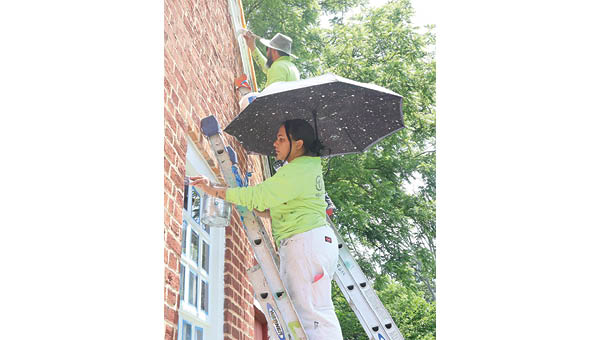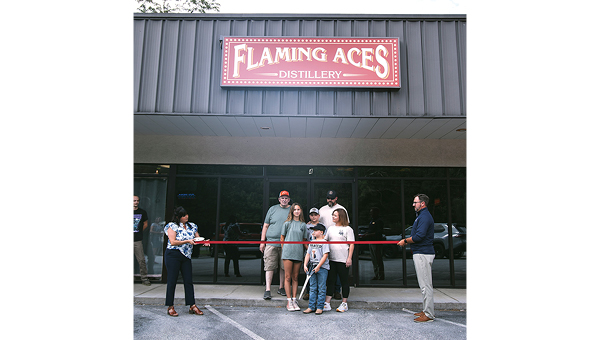Exterior of Greeneville Doak House Museum and grounds receive facelift via state grant
Published 11:34 am Tuesday, June 18, 2024

- Photo Contributed/Eleazar Cruz Castillo, top, and Leslie Color paint at the Doak House Museum.
|
Getting your Trinity Audio player ready...
|
Exterior work at the Doak House Museum is freshening the look of the historic structure and providing enhanced traffic flow for guests arriving and leaving the facility.
Toward the end of 2023, Tusculum University received a $40,000 capital maintenance and improvement grant administered by the Tennessee State Museum. The funds are helping the university preserve the Doak House with repairs and new paint for the windows, doors and other parts of the building. This grant has also enabled Tusculum to address damage to the parking lot from flooding and provided a second access point to the Erwin Highway,
The parking lot update is complete, but the crew working on the house still had a few weeks remaining as of Friday, June 14.
Trending
“This exceedingly worthwhile project showcases our respect for the heritage of the Doak House and our desire to make the building a focal point for many outdoor and indoor activities on campus,” said Dr. Peter Noll, professor of public history and museum studies, who oversees the Doak House. “The facelift to the building will look very nice and offer an even more enjoyable visit for our guests from the community and the Tusculum family The work on the parking lot will also further support the grounds with enhanced accessibility.”
Specifically, Tusculum is repainting all of the wooden surfaces on the exterior of Doak House – trim, window sills, doors – and reglazing all of the windows. The crew is also repairing spots where the wood has rotted and placed calk in some windows. The glazing work is extensive because of the large number of windows and panes within them. It consists of the old-fashioned, tried-and-true method, featuring a compound with linseed oil as an ingredient.
The work on the house will create greater energy efficiency as well, Dr. Noll said.
“A major component of this work is historic preservation,” he said. “You want to maintain as much of the original material and provide maintenance that is the least invasive possible. Preservation is also good environmental policy. You want to fix the windows you have instead of buying new ones. If these wooden windows are properly maintained and properly glazed over time, they are infinitely repairable.”
In the parking lot, Tusculum created a front loop and expanded parking on the north side of the property, where flooding from the adjacent creek does not occur. In addition, vehicles can now enter the grounds through the longtime access point and exit onto the Erwin Highway from the northern section of the lot or by returning the same way they entered. Dr. Noll said the additional access to the Erwin Highway will be helpful for events at the Doak House that draw a sizable crowd.
The gravel on the west side of the parking lot has washed out at least five times in the last two years after heavy rainfall. To address that, the university created the new parking area and placed backfill in the area where the flooding had caused the most damage in the lot.
Trending
This grant comes two years after the university raised funds to restore the chimneys at the Doak House and the adjacent academy. The Greene County Heritage Trust donated $2,250 to Tusculum to support that project.
Tusculum has made a concerted effort to increase activity at the Doak House in recent years. Tusculum Arts Outreach has held “Edgar Allan Poe and Other Haunted Stories in the Woods” the last two years as part of pre-Halloween activities. The university also holds camps on the grounds and hosts the Tennessee Tree Day distribution. During the spring, summer and fall, the Greeneville Farmer’s Market holds sales every Saturday morning at the Doak House. The Farmer’s Market is benefitting from the parking lot work because frontage to the Erwin Highway has increased.
Tusculum has created a nature trail that runs from the spring house at the Doak House through the woods to the Paul E. Hayden Educational Wetland. That initiative came through the leadership of Dr. Noll and Jordan Baker, assistant professor of biology, with help from other Tusculum family members and the community.
Additional arts programming might be coming to the Doak House as well. That includes a new program called “Doak After Dark” in which the university will project performances and movies of cultural significance in the evening on the gable of the Doak House. Open-air theater is another possibility.
The Doak House is a nonprofit educational institution established as a museum in 1975. In about 1830, the Rev. Samuel Witherspoon Doak, who co-founded Tusculum Academy with his father, the Rev. Samuel Doak, built the house.
Doak descendants continued to live in the house until the 1970s. In the mid-1970s, the house was donated to Tusculum University, and the Heritage Trust restored it with the help of a grant from the American Revolution Bicentennial Administration.
The academy building, located behind the Doak House, is a reproduction of the original Tusculum Academy, which merged with Greeneville College to become what is known today as Tusculum University.
“We greatly value the opportunity to connect with the community as part of the commitment in our mission to civic engagement,” Dr. Noll said. “Having guests more frequently on the grounds has given them a greater appreciation for our history while being able to participate in fun activities. We are pleased the Doak House is an integral part of the community’s ties to the university.”





